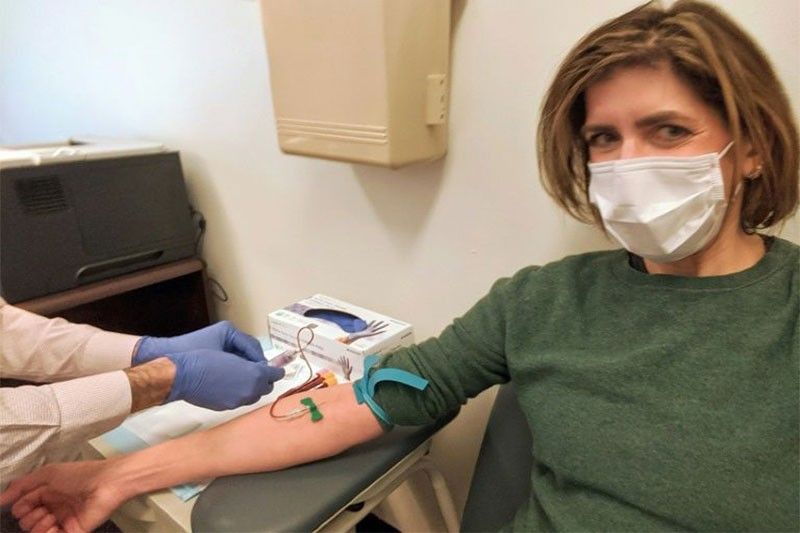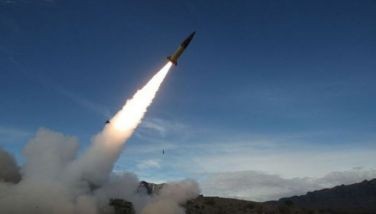'Superheroes': Coronavirus survivors donate plasma hoping to heal the sick

NEW YORK, United States — As she emerges from quarantine, recovered COVID-19 patient Diana Berrent is eager to join the battle against the pandemic and donate precious antibodies that researchers hope might help others.
In mid-March, the New Yorker woke up with a 102-degree (39 Celsius) fever and intense chest heaviness, becoming one of the first from her Long Island neighborhood to test positive for coronavirus.
This week, Berrent was the first survivor in her state screened for antibodies — immune system-generated proteins that can ward off viruses -—to contribute to initial tests seeking treatment for the infection that's left more than 51,000 people dead worldwide.
Convalescent plasma, the fluid in blood teeming with antibodies post-illness, has proven effective in small studies to treat infectious diseases including Ebola and SARS.
Now, the US Food and Drug Administration has greenlit physicians to experiment with the strategy as coronavirus patients fill hospitals and the nation's positive caseload spikes to over 236,000.
Bruce Sachias, chief medical officer of the New York Blood Center — which will collect, test and distribute donations in the city — said while there is reason to believe plasma transfusions can help alleviate the current crisis, tests underway are not intended to yield golden-ticket solutions.
"It's really important for us to be very cognizant of the fact that we're still in very new territory," he said.
Crisis mode
Eldad Hod and Steven Spitalnik — transfusion medicine doctors leading trials at Columbia University's Irving Medical Center — are cautiously optimistic but, like Sachias, emphasize the unknowns.
Spitalnik told AFP they believe "within seven to 14 days after the onset of an infection, that people will develop an immune response and eventually make high amounts of antibodies -- although exactly when the peak of antibody production will be, we don't know."
He said some data suggests antibody production could peak around 28 days post-infection, and hopes the new research could provide a clearer picture.
Hod said each donation "can potentially save three to four lives."
The primary goal now is acquiring a significant plasma stock, so researchers can conduct formal studies with control groups who would receive non-convalescent plasma, and others the antibody-packed donations.
Initial plasma, however, will be distributed for "compassionate use," Hod said — to patients outside studies but for whom other strategies have failed.
They also aim to test treatments on already-hospitalized patients and as a preventative therapy in settings like nursing homes.
Spitalnik said that normally they would want "highly controlled" clinical trials, which take longer but are more definitive.
But "this is a crisis," he said.
"We understand and we are amenable to doing things that will take shorter amounts of time — but hopefully we'll yield at least some rigorous results."
Internal hazmat suit
Berrent is eager to open her personal blood bank and crossing her fingers in hope the process can prove life-saving.
"We can be superheroes," the 45-year-old photographer told AFP.
"These are unprecedented, frightening times where everything is beyond our control — except for we as survivors can help," Berrent said.
"We can be the ones running towards the fire in our own internally built hazmat suit. And that is a tremendous opportunity — how could you not take advantage of that?"
Berrent's antibody levels met donation requirements — but she is waiting on results of a nasal swab test to make sure any remnants of coronavirus have dissipated.
In the meantime, she's started the more than 17,000-member Facebook group "Survivor Corps" to mobilize other survivors to share their immunity.
"I can't wait to donate," Berrent said. "We need a forward-looking solution-based approach that offers hope because things are very, very bleak right now."
'Science will win'
A Houston hospital has already transfused plasma from a recovered patient into someone critically ill, though it's still too early to determine efficacy.
Sachias said hundreds of people who believe they have recovered from COVID-19 have applied to help in New York, the US epicenter of the highly contagious virus that accounts for nearly half of related deaths stateside.
As their research gets underway, Hod said one silver lining of coronavirus' global scale has been the boost to collaborative scientific efforts, saying data is being shared more openly than ever before.
"I think a lot of the scientific community has tried to put their egos aside... and banded together to try and work together for the common good," he said.
"And I think in the end, science will win."
Follow this page for updates on a mysterious pneumonia outbreak that has struck dozens of people in China.
New Zealand Prime Minister Chris Hipkins says on Sunday that he had contracted COVID-19, testing positive at a key point in his flailing campaign for re-election.
Hipkins saYS on his official social media feed that he would need to isolate for up to five days -- less than two weeks before his country's general election.
The leader of the centre-left Labour Party said he started to experience cold symptoms on Saturday and had cancelled most of his weekend engagements. — AFP
The World Health Organization and US health authorities say Friday they are closely monitoring a new variant of COVID-19, although the potential impact of BA.2.86 is currently unknown.
The WHO classified the new variant as one under surveillance "due to the large number (more than 30) of spike gene mutations it carries", it wrote in a bulletin about the pandemic late Thursday.
So far, the variant has only been detected in Israel, Denmark and the United States. — AFP
The World Health Organization says on Friday that the number of new COVID-19 cases reported worldwide rose by 80% in the last month, days after designating a new "variant of interest".
The WHO declared in May that Covid is no longer a global health emergency, but has warned that the virus will continue to circulate and mutate, causing occasional spikes in infections, hospitalisations and deaths.
In its weekly update, the UN agency said that nations reported nearly 1.5 million new cases from July 10 to August 6, an 80% increase compared to the previous 28 days. — AFP
The head of US intelligence says that there was no evidence that the COVID-19 virus was created in the Chinese government's Wuhan research lab.
In a declassified report, the Office of the Director of National Intelligence (ODNI) says they had no information backing recent claims that three scientists at the lab were some of the very first infected with COVID-19 and may have created the virus themselves.
Drawing on intelligence collected by various member agencies of the US intelligence community (IC), the ODNI report says some scientists at the Wuhan lab had done genetic engineering of coronaviruses similar to COVID-19. — AFP
Boris Johnson deliberately misled MPs over Covid lockdown-breaking parties in Downing Street when he was prime minister, a UK parliament committee ruled on Thursday.
The cross-party Privileges Committee said Johnson, 58, would have been suspended as an MP for 90 days for "repeated contempts (of parliament) and for seeking to undermine the parliamentary process".
But he avoided any formal sanction by his peers in the House of Commons by resigning as an MP last week.
In his resignation statement last Friday, Johnson pre-empted publication of the committee's conclusions, claiming a political stitch-up, even though the body has a majority from his own party.
He was unrepentant again on Thursday, accusing the committee of being "anti-democratic... to bring about what is intended to be the final knife-thrust in a protracted political assassination".
Calling it "beneath contempt", he said it was "for the people of this to decide who sits in parliament, not Harriet Harman", the veteran opposition Labour MP who chaired the seven-person committee. — AFP
- Latest
- Trending































